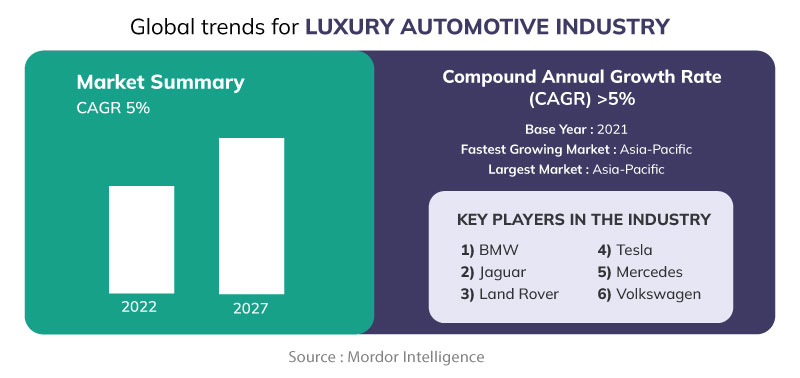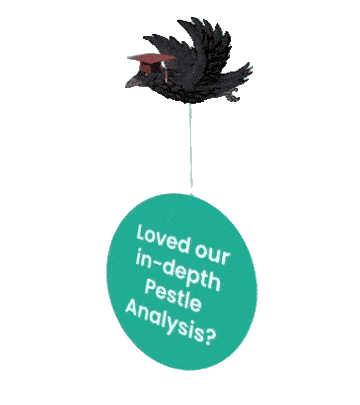BMW Overview
BMW is a German luxury automobile manufacturer that is known for its class, reliability, and technology. The company sells its vehicles in more than 140 countries (BMW, 2022). The profits of the company are witnessing huge growth and in 2021 it was able to generate 200% more profit before tax, the total profit amounted to 16,060 Euros. BMW has a total workforce of 118,900 people across the globe.
Furthermore, the company’s mission is to become the world's leading provider of premium products and premium services for individual mobility and it is fulfilling its mission by launching quality products in the premium segment. Its vehicles are equipped with the latest technologies and the most luxurious features one can expect from a premium automotive company.
Table of Contents
PESTLE Analysis is one of the important tools to analyze the external environment that can impact the industry. This article would analyze the impact of the political, economic, social, technological, legal as well as environmental factors that can have an impact on the automobile industry. The PESTLE analysis would prove to be beneficial for the auto companies to formulate strategies for efficient operations in Germany as well as China. To seek help with understanding the process of conducting a PESTLE analysis, you can go through our elaborative guide on conducting a PESTLE analysis.
A meticulous PESTLE Analysis of BMW
Political factors affecting BMW
The federal government of Germany has announced a funding of $5.9 billion to assist the auto companies in recovering from the losses due to the pandemic. Further, the government is offering the customers a cash bonus of up to 4000 Euros to customers for purchasing electric vehicles (Delfs & Rauwald, 2021). More customers would prefer purchasing EVs as a result of a cash bonus. This signifies the need for the companies to aggressively invest in the manufacturing of EV vehicles to increase their revenues.
Besides, China is another major market for luxury auto companies and the government of China recently abolished the limits on foreign investment in manufacturing passenger cars and now the companies can hold 100% equity in the production process (Cheng, 2021). This would provide the companies with greater control over their operations. In addition, the taxation norms have been simplified and now the customer would be charged tax on the price that the customer paid to the dealer rather than the manufacturer’s suggested retail price which was the case till now. This would lower the tax liability of the customers.
Economic factors affecting BMW
The German economy is experiencing high fluctuations. The growth in 2021 was 2.8%% and in 2022 and 2023 it is expected to be at 3.6% and 2.6% respectively (IMF, 2021). Further, the unemployment rate by the end of 2021 was 5.1% (KPMG, 2022). The future predicted unemployment rate for 2023 and 2024 is 4.9% and 4.7% respectively. The moderate unemployment rate signifies more job holders in the economy, therefore the companies would have to shell out more money to recruit labor. Also, inflation is at a record high and it reached 3.1%% in 2021. Even after the record rise, the inflation is still moderate which means that there would not be much increase in the prices of raw materials and thus the cost of output would be stable.
Furthermore, China achieved high growth of 8.1% in 2021 but it is predicted to dip to 5.1% in 2022. In addition, the inflation level in 2021 in China was very low at 0.9% and it is expected to rise to 2.2% in 2022 which is too low, and hence the automobile industry may face lower demand. Moreover, the interest rates in China have been lowered by 10 basis points (Chen, 2022). This is positive news for the automobile industry as the cost of borrowing the vehicles would decrease for the customers, thus ultimately leading to an increase in the sales of the vehicles.
The automotive industry in Germany witnessed a decline of 10.1% and the industry generated total revenue of 456.6 billion Euros in 2021. Additionally, Germany is Europe’s largest automotive market accounting for more than 30% of passenger cars. The industry is predicted to witness a growth of 5% CAGR by 2026.

Social factors affecting BMW
In contemporary times, people are embracing modern lifestyles and have a positive attitude toward owning cars. Besides, in Germany, more than 9.65 million people prefer environmentally-friendly vehicles. Further, people are ready to pay a premium for ultra-modern and high-performing EVs (Koptyug, 2022). This highlights the need for the companies to innovate and manufacture high-quality EVs to increase sales.
Furthermore, the preference for luxury automobile products among the people of China has risen from 34% in 2020 to 40% in 2021, thus signifying a positive scope for luxury carmakers.
Also, the social preference is now higher for cars that have enhanced safety features in the wake of rising instances of car accidents and fatal injuries. Having said that, the companies will have to undertake effective change management to adjust with respect to evolving consumer behaviors.
Technological factors affecting BMW
The German government spends 75 billion Euros yearly on average on research and development while China is the second-largest country in terms of expenditure on R&D, it spent 2 trillion yuan in 2021.
Various technologies that are merging in the automobile sector include artificial intelligence which is used for tracking vehicular data. Also, the use of chatbots enables the companies to automate the customer service department and the companies can stay in touch with their customers all the time. Autonomous vehicles are also gaining trend wherein the vehicles are tech-enabled and the vehicle can itself control many functions, for example, it has the ability to maintain a safe distance from the vehicle ahead by analyzing the surroundings through sensors. Further, the companies are making use of 3D printing for developing the prototypes of vehicles along with manufacturing spare parts. In addition, auto companies are using virtual reality technology for showcasing their vehicles to customers (Wadhwani, 2021).
Legal factors affecting BMW
Various laws that govern the automobile industry in Germany include the Automated Driving Act, Product Liability Act, Patents Act, etc. The Automated Driving Act states that automated vehicles would only be permitted on roads if a driver is present in the vehicle and fully automated operations i.e. driverless technology is not permitted (Oitzman, 2021). Further, the patents in Germany are governed by the Patents Act and European Patent Convention. The timeframe for which patents are granted is 20 years. In addition, the Product Liability Act enlists the responsibilities of the manufacturers and retailers for the provision of safe goods to the customers. If the customer gets injured or dies using the product, then the companies may be required to reimburse the damages to the consumer up to the maximum amount of 85 million Euros per product (Pinsent Masons, 2019). Therefore, the companies should focus on building quality products with enhanced safety features to avoid high penalties. For that, they need strong change management models to keep pace with the changing dynamics of the industry.
Moreover, there are several laws that automobile companies are required to adhere to in China as well. These include the newly formed rules for the management of automobile data which states that the data collected by the companies related to the passengers should be stored within the territory of China and cannot be transferred abroad without prior approval from the regulator. Furthermore, the anti-monopoly guidelines by China state that the companies cannot force resellers to adhere to unreasonable sales targets, and forcing the distributors to fix the sales price is illegal, so the companies must be aware of the guidelines while conducting the operations.
Environmental factors affecting BMW
The automotive sector in Germany produces 9% of the total greenhouse gas emissions and fossil fuels result in massive air pollution. To mitigate the pollution, the federal government of Germany has initiated various steps that include increasing taxes on vehicles that produce more than 95 grams of carbon dioxide per km (DW, 2020). Further, the European Commission has formulated a scheme named ‘Fit for 55’ wherein from 2035 only the vehicles that run on electric batteries or hydrogen would be allowed to be sold in the whole of Europe. Therefore, the companies should quickly enhance their EV infrastructure to avoid disruptions in operations.
Besides, vehicles are one of the main sources of pollution in China and the automobile industry emits around 7.7 million tons of carbon monoxide. To ensure the reduction in pollution, the Chinese government has introduced new China VI standards that aim to reduce the emission of nitrogen oxides. Further, the government has halted the production of more than 500 models in China due to environmental concerns, so the companies should take necessary measures to reduce emissions from their vehicles to continue operations without any disruptions (Tabuchi, 2018). Also, China has announced its net zero emissions target for 2060 which will force industries to keep their emissions in check and rely more on clean energy.
To conclude, the political environment in Germany is supportive of the auto companies as the companies are being provided with assistance to recover their losses. Further, the Chinese government is promoting investments by eliminating the cap limit that is set on ownership of foreign companies in China. The economic parameters are moderate in Germany and the unemployment is within the UN standards which implies that companies would be shelling out more money to attract employees. Furthermore, the auto companies can benefit from their operations in China as the market is the largest in Europe. In terms of promoting innovation, both German and Chinese companies spend a lot. In addition, the buying pattern is changing among the consumers and more and more people are now shifting toward electronic vehicles because of environmental concerns. In Germany, the consumer laws are strict and companies can be fined up to 75 million for defects in a single product. Also, the engine norms in China have been amended due to which the operating costs of the companies can rise as they would have to manufacture engines with new technologies.
Moreover, the internal strengths and weaknesses of BMW will determine how effectively the company can deal with the opportunities and threats identified through this PESTLE. For that, you can go through our intellectually conducted SWOT Analysis of BMW.
Recommended Readings
References
Cheng, E. (2021). China to remove limits on foreign investment in passenger car manufacturing. www.cnbc.com. Retrieved 29 March 2022, from https://www.cnbc.com/2021/12/27/china-to-remove-foreign-investment-limit-passenger-car-manufacturing.html.
ET. (2020). German car sales improve in January after 2021 struggles. auto.economictimes.indiatimes.com/. Retrieved 29 March 2022, from https://auto.economictimes.indiatimes.com/news/passenger-vehicle/cars/german-car-sales-improve-in-january-after-2021-struggles/89330062.
KPMG. (2022). Economic Key Facts Germany. home.kpmg. Retrieved 29 March 2022, from https://home.kpmg/de/en/home/insights/2020/10/international-business/economic-key-facts-germany.html.
Oitzman, M. (2021). German Bundestag adopts autonomous driving law. www.therobotreport.com. Retrieved 29 March 2022, from https://www.therobotreport.com/german-bundestag-adopts-autonomous-driving-law/
Pinsent Masons. (2019). Product liability and recalls in Germany. www.pinsentmasons.com. Retrieved 29 March 2022, from https://www.pinsentmasons.com/out-law/guides/product-liability-and-recalls-in-germany#:~:text=The%20Product%20Liability%20Act%20places,of%20the%20German%20Civil%20Code.
Wu, Y. (2020). China Publishes Long-Awaited Anti-Monopoly Guidelines for the Automobile Industry. www.jonesday.com. Retrieved 29 March 2022, from https://www.jonesday.com/en/insights/2020/09/china-publishes-longawaited-antimonopoly-guidelines-for-the-automobile-industry
Xinbua. (2022). Economic Watch: China's inflation tame in 2021 amid stable economy. www.xinhuanet.com. Retrieved 29 March 2022, from http://www.xinhuanet.com/english/20220112/3896fecacf6f430fbe7911f2e0197412/c.html

 Proof Reading
Proof Reading  Copy Writing
Copy Writing  Resume Writing
Resume Writing  Blogs
Blogs Guides
Guides SOP's
SOP's Student Resources
Student Resources Research Topics
Research Topics Login
Login Register
Register



